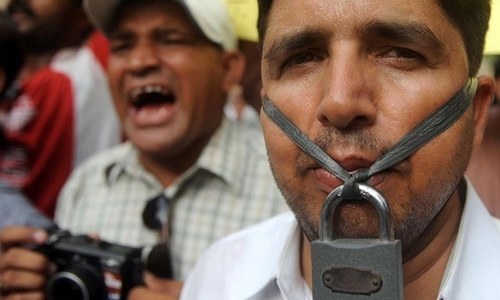
ISLAMABAD: Head of the European Union’s Election Observation Mission and member of European parliament Michael Gahler has noted that election time does not provide immunity to candidates against the legal course.
“The principle is that no institution ceases to work after the announcement of election schedule,” he said while answering a question about the arrest of a PML-N candidate by the anti-corruption watchdog at a press conference held here on Thursday to officially launch the mission to observe the July 25 general elections.
He said nobody was above the law and entitled to immunity just because it was election time. He said while the Election Commission of Pakistan (ECP) functioned for the conduct of elections, other institutions continued to do their own work. He, however, said: “We are very cautious and cannot give a judgement.”
Answering a question, he said violence had considerably dropped in Pakistan as compared to the 2013 general elections. He also pointed out that the ECP had sought deployment of the army at polling stations and observed that army was not generally considered as an institution which favoured one party or the other. He said in some countries the army worked as a tool of the ruling party. He particularly cited example of Zimbabwe’s Robert Mugabe who used the army to crush his political opponents for decades.
While ECP functions for the conduct of elections, other institutions continue to do their own work, says EU observer
In reply to a question about allegations that ‘aliens’ were at work to steal the general elections, he said: “We are not in a position to anticipate anything.”
He, however, said the mission would see when something was not done in accordance with the law.
Mr Gahler said the legal framework had strengthened the ECP’s role and quality of electoral rolls had been improved. Giving details of the recommendations of the previous EU mission that had been incorporated in the new electoral law, he said the ECP had been given financial autonomy, size of a constituency had been determined, campaign to enlist women as voters had been launched and the law now allowed the ECP to declare elections of a constituency void if the percentage of women voters was less than 10 per cent.
Asked to comment on the code of conduct for international observers, he said it appeared to be a copy-paste of the code for the 2013 polls.
In his opening remarks, Mr Gahler said it was a great privilege to have been given this opportunity to lead once again the EU Election Observation Mission to Pakistan.
“The elections on July 25 mark an important stage in Pakistan’s democratic development, and I am very much hopeful that our presence will contribute to a transparent electoral process.”
Mr Gahler said the mandate of his mission was to observe all aspects of the electoral process and to assess the extent to which the elections were in compliance with the laws of Pakistan, as well as with international and regional commitments for democratic elections to which Pakistan was a signatory.
The mission is currently made up of a core team of 10 election analysts based in Islamabad. Sixty long-term observers will arrive over the next few days and will be deployed across the country in early July.
“When the long-term observers arrive in their areas of observation, they will start meeting election officials, candidates and representatives of civil society. They will report their observations back to the core team in Islamabad, and these will contribute to the mission’s informed and impartial assessment of the electoral process,” Mr Gahler said.
He said that shortly after the election the mission would issue a preliminary statement. The mission will remain in Pakistan until September. It will also be joined by a delegation of seven members of the European Parliament, as well as diplomats from European embassies resident in Pakistan. At full strength, the mission will comprise up to 100 observers.
A more comprehensive final report, including recommendations for future electoral processes, will be published approximately two months later.
Published in Dawn, June 29th, 2018












































